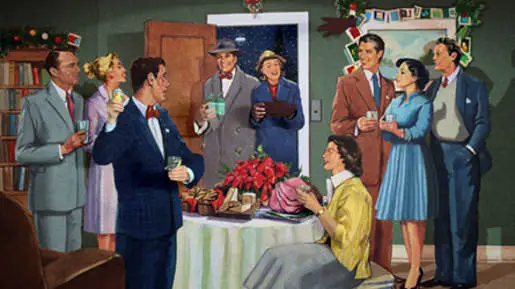
Punctuality is something like a virtue. It respects other people’s time, demonstrates reliability, and requires integrity and discipline. Given that it’s virtue-adjacent, it can seem like the more stringent the practice of punctuality, the better, and so you get maxims like: “Early is on time; on time is late.”
However, there are situations when being late is entirely acceptable, and even desirable. There are even conditions where being late is actually more polite than being on time. We’ll run through these exceptions to the always-be-punctual rule below.
Date (With At-Home Pick-Up)
If you’re meeting a date at a restaurant or coffee shop, you want to be on time, and maybe even a few minutes early to get yourself settled and establish your poise. Especially on a first date, you want to make a good impression, and rolling in late decidedly does not.
But if you’re picking a date up from her house/apartment (more likely to be the case if you knew her already or are in high school/college), then it’s actually nice to arrive just a bit late. Getting there early is a definite no-no, lest you make your lady friend answer the door with curlers in her hair (do women still put curlers in their hair?), and as she’ll likely be getting ready right up until the time you knock, getting there late provides her a bit of buffer to complete this process. Even if she’s ready on time, she won’t mind having the chance to give herself one last look in the mirror. So get there just a few minutes late — no more than five, lest she begin to worry you’ve stood her up.
Restaurant Reservation
Restaurants will typically hold your reservation for 15 minutes after the scheduled time, so if you’re running a little late, you don’t have to panic. (If you’re going to be more than 15 minutes late, give them a call to let them know.) Restaurants don’t always have your table ready exactly at your reservation time anyway, so if you arrive five minutes late, there’s a better chance you’ll be seated straight away.
Of course, you also want to be respectful of the restaurant’s staff and its other customers; if you’re late, then your dining time may run long, which means your table won’t be ready at the reservation time held by its subsequent occupants. Nice restaurants typically allot two hours of dining time per reservation, so just make sure you don’t exceed that, timed from when your original reservation began (e.g., if your reservation was at 6:00, and you showed up at 6:10, still depart by 8:00).
Music Concert
If you’re going to a nice show in a seated theater — a ballet, play, musical, orchestral performance — you should show up early. Find your seat; get settled in; read through the program. The doors close once the show starts (you’ll often have to wait until a break/intermission to be let in), and you don’t want to disturb the experience of others by being the guy who has to be shown to his row with a flashlight-wielding usher and climb over fellow audience members to get to his seat.
There’s an entirely different equation when it comes to “popular,” non-high-brow music concerts. If you’re going to see your favorite band in the world, it’s a general admission show (sans assigned seating), and you want to be as close to the stage as possible, then you might want to arrive an hour (or many hours, depending on the band’s popularity) before the doors open. But in most cases, positioning yourself close to the stage is pretty overrated (especially as you get older), given that the area is hot, crowded, cramped, sweaty, and, depending on the genre of music being played, liable to turn into a mosh pit.
If you’re not interested in getting close to the stage, nor in hearing the opening act, then it’s best to show up late to a concert.
There’s no set, hard-and-fast schedule as to when a headliner will take the stage. On average though, the opening band will start playing 30-60 minutes after the doors open, and play for around 30-45 minutes, after which comes the transition time in which the stage is set up for the headliner. The headliner will thus start playing around two+ hours after the doors open. Here’s an example of how this could go: doors open at 6:30; opening band starts playing at 7:30; headliner begins show at 9:00. To strike a balance between minimizing your wait-around, stand-around time, and minimizing the risk of missing any of the headliner’s show, aim to arrive around an hour and a half after the doors open.
No comments:
Post a Comment